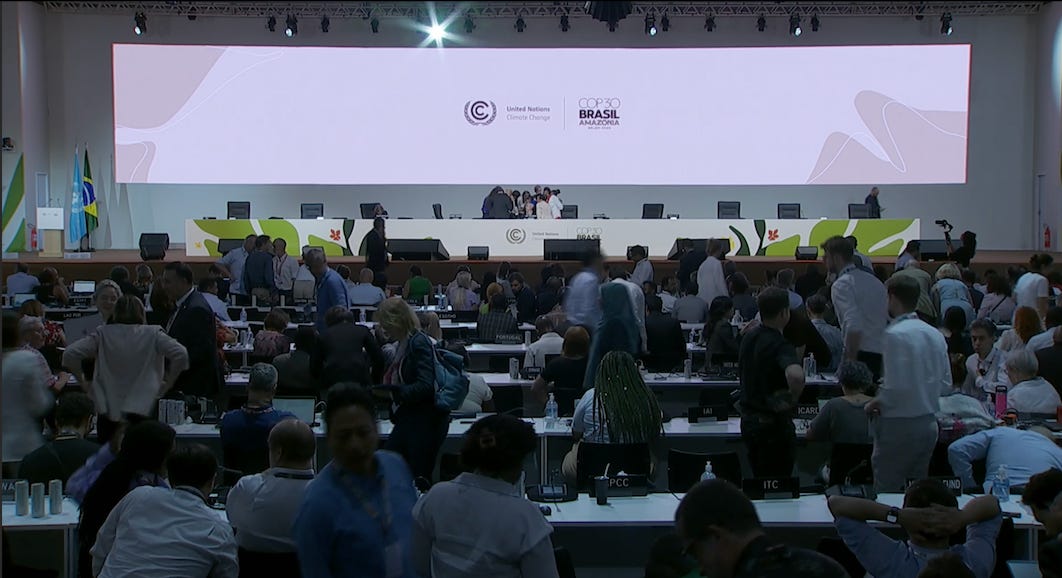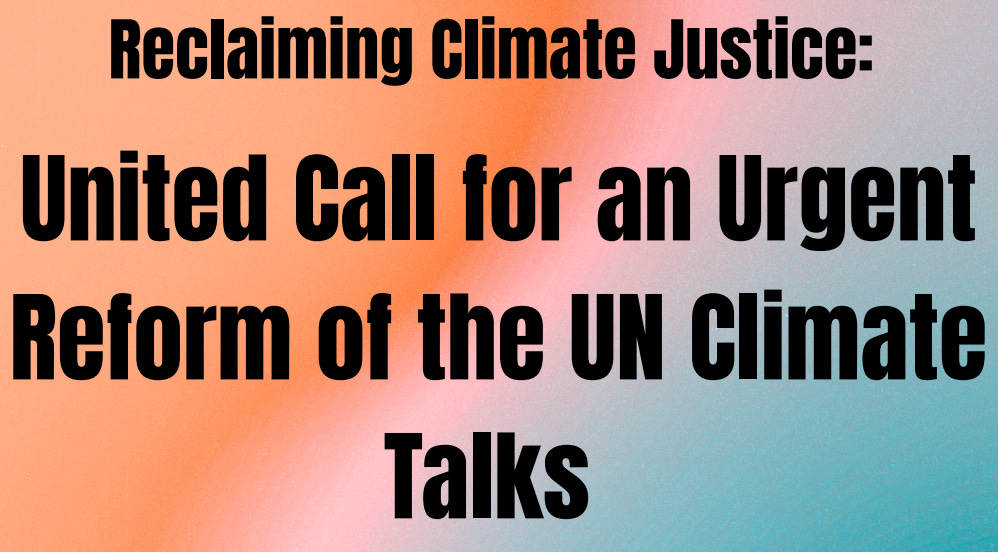Is there life after COP? And is UNFCCC reform even possible?
With so many COP 30 eulogies, we need to ask if our toxic relationship with the climate change negotiations system is part of the problem.
Michael E. Mann published a short text with an important reminder at the end of COP 30: despite small victories, the COP system has fundamentally failed to halt climate change and produce the mitigation and adaptation politics that would keep us below 1.5C warming.
The UNFCCC system was once thought to be the best we had in climate diplomacy and multilateralism. It soon became stale, frustrating, and filled with climate denialists, but we keeping adhering to it because it might not be the best, but it is what we have.
(The final plenary was suspended for a while on Saturday, after delegates complained that procedures were not being followed)
There are many reasons for the UNFCCC system failure, but let's focus on three:
The system is designed to focus on emissions, not their source.
The fact that we can't even mention fossil fuels in final texts is basic evidence that COPs will keeping failing us. This enables fossil fuel producers to blackmail their way through negotiations and helps false market solutions - which have twisted “mitigation” into credits and trade - appear reasonable in the fact of very little progress.
This lets states make weak pledges in their NDCs (which they don't even feel like they have to update and submit anymore anyway) without any incentive or intention to actually transition the economic sectors responsible for most emissions. (This also applies to deforestation, since most states treat it as a magical phenomenon that they will reduce through strong policy, but without taking away the power of ecocidal agribusiness, mining and industry - let alone discussing the much-needed reduction of meat consumption!)
The system is based on flawed multilateral consensus rules and procedures.
This point raised by Mann is of utmost importance: “A small number of rogue nations cannot be allowed to block progress for the rest of the world. One suggestion has been a rule change requiring a three-fourths (75%) rather than a “consensus” of all countries for reaching an agreement. The cruel irony here, however, is that such a rule change would also require “consensus” among participating nations. There’s an easier solution however. It simply involves looking up the word “consensus” in the dictionary. … By such a definition, three-fourths support seems more than adequate to constitute “consensus” and, thereby, pass an agreement, under current rules, that meets the moment and commits to a rapid phaseout of planet-warming fossil carbon emissions.”
When unanimity is not reached, the tendency has been to celebrate a handful of voluntary proposals and mechanisms led by some cooperating states, but that they may not even feel inclined to implement anyway. (This was Brazil's answer for the failure of lack of a fossil fuel roadmap. Ambassador Do Lago said “I will create a roadmap” and, while better than nothing, it feels like another consolation prize that we have no idea what will look like in the end.)
So, if full unanimous agreements are becoming weaker or are being disrespected anyway, leading countries to do their own thing, one might say the procedures are failing no matter what.
This one is just because it annoys the hell out of me: soooo many congratulatory texts and celebratory clauses about things the countries have failed to properly implement! Why are these even doing there? Just out of diplomatic tradition of giving each other a pat on the back? Do we really have all this time to waste?
The system opened the doors to big capital and polluters and they're running the show.
I started looking into the influence of big corporations into the UNFCCC system back in 2011. There was even a report back then when I was just a Master's student. The fact is: it's only gotten worse. Every year is now a record year for big oil and big agribusiness. They get in through BINGOs, they get in through Party delegations (nice little credentials with extra access for polluters!), they get in as sponsors, they get in to showcase their good good green work at the green zone, they get in through hosting side events that will feed and entertain tired delegates. It's a disaster.
“Oh, but scientists, research institutions, and civil society organisations are getting more badges too.” Obviously, the UNFCCC loves to talk big about inclusivity and democracy, but when you include everyone to a conference designed to fight climate change, including the people and orgs that are hoping to let the planet burn, you're using “inclusion” to mask injustice.
Obs: COP 30 brought some really disgusting partners and sponsors, I recommend you look at this post by A Growing Culture":
That said, what to do?
Well, we have at least two options:
We can go for a big and urgent push for UNFCCC reform.
This is already part of the agenda of civil society. Here's a document from earlier this year with suggestions called “Reclaiming Climate Justice: United Call for an UrgentReform of the UN Climate Talks”. It gives us a really interesting blueprint and we should be acting on it to pressure the UNFCCC before COP31. I particularly like the part about ending the trade show, because, let's be honest, this is what the Blue Zone pavilion has become outside of the negotiating rooms as of late. So, seriously, if you're by any chance reading my tiny humble blog, then I know you know it's way more important that you read this document and discuss it with your organisation:
This need for change was even recognised by Brazil's COP 30 Presidency. Basically, everyone who presides a COP and actually wants to get things done knows that the system is broken. Yet, we haven't had a since state (president of COP or not) actually push for reform talks. What we get is a few more committees, a few more civil society badges, and (when we're lucky) a few of a our critical demands actually included in the agenda. This is basically what happened in Belém: we got the just transition points in from the beginning, which secured a victory, but Lula (a big supporter of oil drilling in Brazil) only mentioned a fossil fuel roadmap when the COP was about the begin. If we had UNFCCC reform, maybe two weeks would have been enough to draft and aprove a roadmap to a roadmap (not an actual one, with expert-led parameters, as it should be, so let's all be honest and stop telling ourselves a reeeeeal roadmap would have been produced so fast). But in the current system, we get shut down by merely wanting to mention fossil fuels in the final document (something accomplished in Dubai, but that major petro-states won't allow anymore).
And/Or we can build the treaties and agreements we need through different platforms, but starting only with the states that actually want to help.
It can be platforms we are already familiar with. This is what the Fossil Fuel Non-Proliferation Treaty Initiative is trying to accomplish. It can build on past successful examples and existing tools to get the ball rolling on the topic that never seems to make it to the stage that is needed during COPs. It is not supposed to be an alternative to the UNFCCC system, but it could be a way to breathe life back into it. So, all eyes on Santa Marta, Colombia, next year!
We can also push for a global mechanism that could integrate and govern climate-related aspects of other treaties and negotiations. Something like a benchmark against 2C warming. This initiative could be hosted copying and improving the UNFCCC rules, but what matters is that it could, just like the Treaty initiative, start with the states that actually want to cooperate on the matter (leaving rogue ones out!) so they could establish a common benchmark to govern their other spaces of cooperation. It could help to form blocs when it comes to trade negotiations, labour standards, and even influence economic blocs such as the BRICS or impact G20 talks (yey, multipolarity! Isn't it what a bunch of people are excited about anyway?)
None of this is detailed or foolproof. My point is to offer a bit of brainstorming on the much needed way out of this constant COP stalemate. All of us who are climate scientists and/or climate activists are getting sick of how mournful we get at the end of each COP, only to devote so much energy to it again the next year. It feels like we are stuck in a very toxic relationship with the UNFCCC at this point.
That's why I believe it's important to dedicate more of our energy not to COP eulogies, but concrete strategies that will help us escape this prison.
What forces can strengthen the call for UNFCCC reform right now? Which organisations? Would any states embrace it? Can our most prominent climate scientists make the global call for it? Most importantly, do we have time to create meetings to discuss ideas to draft proposals to debate at conferences and see if we finally get UNFCCC reform before it's definitely too late?
And if we focus on the latter, the parallel mechanisms, how do we choose which ones, the rules, and the priorities, especially when we know the majority of states will only do something when we make them do it?
This even goes for the climate-friendly states, since many of them are only willing to pay the costs of transition if they know others are paying too, after all, they're in competition. In the meantime, the states that need help to transition, to deal with their loss and damage, to properly adapt, are being held hostage in this game.
Countries in the Global South are very excited about multipolarity nowadays. They talk about China, BRICS, building outside of the Bretton Wood Institutions, or about reforming the UN Security Council (which just handed Gaza back to colonial mandate times), the World Bank and the IMF (reforming this one seems like pure rhetoric to me). So why won't they embrace reforming the UNFCCC? It's easy to say the system is broken, but who will help to echo the call by civil society to make climate negotiations work - and fast?
We can also say that reform is not possible, that we need to outgrow not just COP, but the multilateral system completely. While I agree with it in principle (especially in my activist principles), the reality is that we need states to cooperate on this matter too. We're not quite yet living my dream of pluri-national ecological sovereignty, but still in this messed-up Westphalian state system where they call very important structural shots. This means that parallel initiatives such as the Peoples’ Summit are still fundamental, but they're not quite yet how we'll manage to break away from fossil fuels and big agribusiness. They're how we organise and refine our arguments and our politics, but we still need to translate these politics into mechanisms that states will use (or that will be used on them).
In the end, it's about a multi-prong approach that will still be imperfect. But it's definitely going to be better than this horrible system that we deal with every year.
Ps: if you're interested in a recent academic paper reviewing UNFCCC reform debates, check out: Nasiritousi, Naghmeh, Alexandra Buylova, e Björn-Ola Linnér. “Matching Supply and Demand? Exploring UNFCCC Reform Options”. Earth System Governance 23 (2025): 100241.







I read about them cutting down chunks of the Amazon rainforest to make a highway to the conference. Irony.
Hardly at all. Global warming is caused by the emission of greenhouse gases into the atmosphere rather than the direct emission of heat. Greenhouse gases prevent heat (blackbody radiation) from escaping the Earth to space. The effect is much the same as multiplying the Sun’s energy by a small amount. Greenhouse gases remain in the atmosphere for thousands of years with this multiplying effect being continuous the whole time! The Sun’s energy is much greater than all of the human primary energy consumption, so the greenhouse gas effect dominates over the heat emitted from energy use.
Most energy use does cause some greenhouse gas emissions because a lot of fossil fuels are still used in the energy grid, so data centers are potentially contributing to global warming that way. Big data center providers, such as Google, buy all their power from renewable energy companies who have very low greenhouse gas emissions.